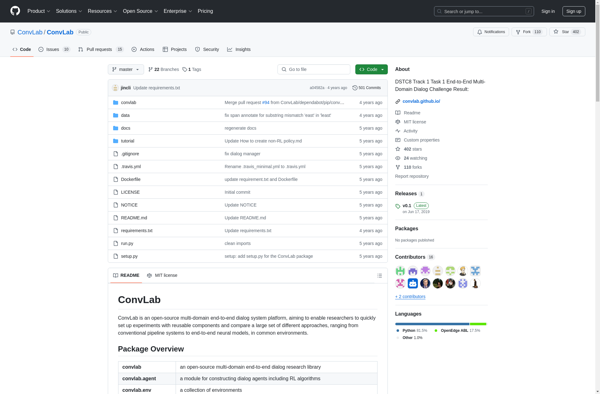PyDial
PyDial is an open-source toolkit for building spoken dialogue systems. It provides modules for speech recognition, natural language understanding, dialogue management, natural language generation, and speech synthesis to facilitate the development of task-oriented dialogue agents

PyDial: Open-Source Toolkit for Spoken Dialogue Systems
PyDial provides modules for speech recognition, natural language understanding, dialogue management, natural language generation, and speech synthesis to facilitate the development of task-oriented dialogue agents.
What is PyDial?
PyDial is an open-source toolkit for building spoken dialogue systems. It is implemented in Python and provides a set of reusable modules that facilitate the rapid development of task-oriented dialogue agents.
Some of the key capabilities and features of PyDial include:
- Automatic speech recognition (ASR) - PyDial integrates several ASR engines like Google Cloud Speech, Wit.ai, IBM Watson to transcribe user speech input.
- Natural language understanding (NLU) - Interprets the user input using domain-specific semantic grammars and statistical models to determine user intent and extract semantic slots or entities.
- Dialogue management - Handles the conversation flow and decides the next best action using reinforcement learning and agenda-based methods.
- Natural language generation (NLG) - Converts dialogue acts into natural language responses to interact with the user.
- Speech synthesis - Uses text-to-speech services to vocalize system responses.
- Simulation tools - Enables trial-based testing of dialogue strategies in a simulated environment.
- Modular design - Key system components are designed as pluggable and extensible modules.
- Reusable resources - Pre-built domain ontologies, lexicons, corpora templates to bootstrap development.
PyDial simplifies prototyping and developing robust task-oriented dialogue systems by providing all the necessary capabilities within an integrated common framework.
PyDial Features
Features
- Speech recognition
- Natural language understanding
- Dialogue management
- Natural language generation
- Speech synthesis
Pricing
- Open Source
Pros
Open source
Modular architecture
Active development community
Well documented
Cons
Steep learning curve
Limited to task-oriented dialog systems
Requires expertise in dialog system development
Official Links
Reviews & Ratings
Login to ReviewThe Best PyDial Alternatives
Top Ai Tools & Services and Conversational Ai and other similar apps like PyDial
Here are some alternatives to PyDial:
Suggest an alternative ❐DeepPavlov
DeepPavlov is an open-source library focused on deep learning end-to-end dialog systems and knowledge-grounded conversational AI agents. It allows researchers and developers to quickly prototype conversational AI assistants.Some key capabilities and features of DeepPavlov include:Pre-trained models for tasks like intent recognition, slot filling, sentiment analysis, question answering, document ranking etc.Tools...

ParlAI
ParlAI (pronounced "par-lay") is an open-source software platform created by Facebook AI Research for developing conversational artificial intelligence agents. Its key features include:Unified framework for interacting with many popular dialogue datasets like SQuAD, bAbI tasks, MOOC, Twitter, etc.Support for training and evaluating chit-chat models, question answering, task completion and moreTools...

ConvLab
ConvLab is an open-source toolkit for building conversational AI agents. It provides a set of reusable components that can be easily customized and assembled to create multi-modal, multi-agent conversational systems for various conversation scenarios such as chit-chat, recommendation, negotiation and task-completion.Some key features of ConvLab include:Modular architecture - Components such...

Plato Research Dialogue System
Plato Research Dialogue System is an open-source conversational AI platform developed by Amazon Alexa team. It is designed to advance state-of-the-art AI methods for building chatbots and dialogue systems using machine learning techniques.Plato provides tools and capabilities to train dialogue agents through text conversations. The goal of Plato is to...

Virtual Human Toolkit
The Virtual Human Toolkit (VHTK) is an open-source platform developed by the University of Southern California Institute for Creative Technologies for building and deploying embodied conversational agents, also known as virtual humans. VHTK provides a comprehensive set of tools for creating 3D virtual character models, animating them using procedural animation...

Rasa Core
Rasa Core is an open-source machine learning framework for developing contextual AI assistants and chatbots. It provides the dialogue management and conversational capabilities to have natural, flexible conversations.Some key features of Rasa Core include:Contextual conversations - Rasa Core tracks context during conversations to respond appropriately and have logical flows.Custom actions...
